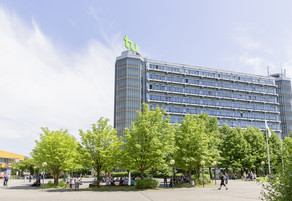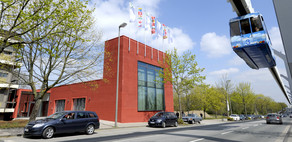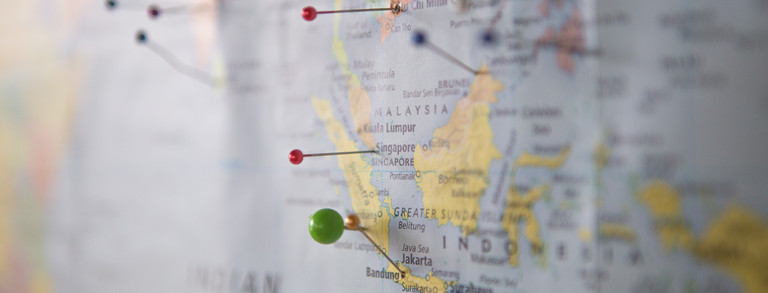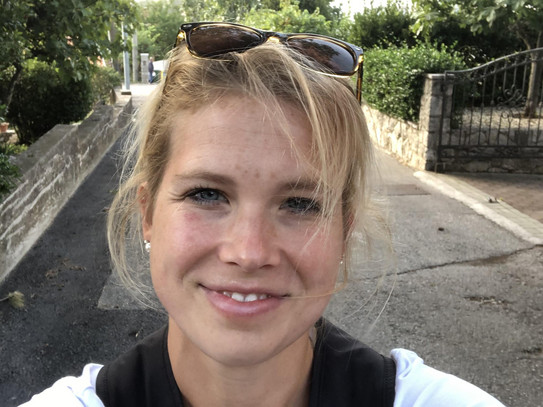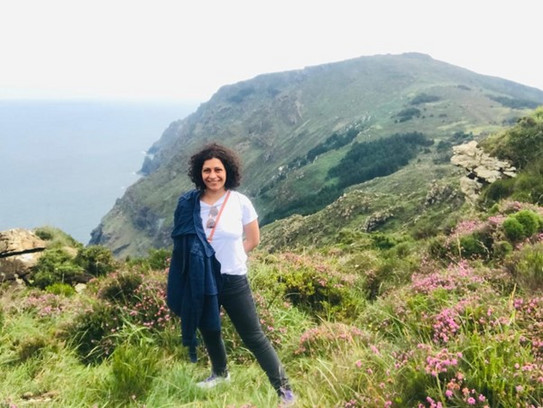Erasmus+ Teaching Staff Mobility
The EU education program Erasmus+ has been promoting cross-border mobility of students and university academic and non-academic staff since 1987. In addition, diverse cooperation and partnership programs offer far-reaching opportunities for institutional exchange between universities in Europe and worldwide.
Teaching staff at TU Dortmund University can apply for an Erasmus+ mobility grant via the International Office. The prerequisite for teaching abroad is a valid Erasmus+ Inter-Institutional Agreement and consultation with the Erasmus+ Departmental Coordinator.
Well Informed
- Professors and lecturers with a contractual relationship with TU Dortmund University
- Lecturers without endowment at TU Dortmund University
- Adjunct lecturers at TU Dortmund University
- Academic staff of TU Dortmund University
Program Countries:
27 Member States of the European Union (EU)
Belgium | Bulgaria | Denmark | Estonia | Finland | France | Greece | Ireland | Italy | Croatia | Latvia | Lithuania | Luxembourg | Malta | Netherlands | Austria | Poland | Portugal | Romania | Sweden | Slovakia | Slovenia | Spain | Czech Republic | Hungary | Cyprus
6 Countries outside the EU
Iceland | Liechtenstein | Northern Macedonia | Norway | Serbia | Turkey| United Kingdom
The partner countries are also clearly listed on the DAAD website. Here there is the possibility to apply for funds via Erasmus+ International Mobility in KA131.
United Kingdom
In the current Erasmus + program generation (2021-2027), the United Kingdom is eligible as a partner country. Due to the international opening of the funding line KA131, outgoing mobilities from Germany to the UK are eligible for both staff and students if TU Dortmund University receives sufficient funds in the corresponding Call.
From the 2027/2028 academic year, the United Kingdom will once again participate in the Erasmus+ program as a program country. Details regarding the return are still being clarified.
Switzerland
From the 2027/2028 academic year, Switzerland will also return to the Erasmus+ program as a program country. Details regarding the return are still being clarified.
Each department has Erasmus+ Inter-Institutional Agreements that contractually stipulate student and/or teaching staff mobilities. Therefore, only mobilities for which a corresponding Erasmus+ Inter-Institutional Agreement exists can be funded.
Erasmus+ partner universities (teaching staff mobility)
Erasmus+ partner universities (student mobility)*
*On the linked page you can see who is the Erasmus+ Departmental Coordinator in your department and find out about the opportunities for teaching staff.
Guest lecturers can strengthen the European dimension of the host university through their Erasmus+ mobility, complement its range of courses and impart their specialist knowledge to students who do not want to or cannot study abroad.
Further goals may be:
- Development of a joint study program
- Exchange of teaching content and methods
- Strengthen and develop links between departments
- Preparation of future cooperation projects
- Participants belong to the group of people mentioned (see "Who Can Apply?")
- Only for teaching stays (not for conference participation)
- An Erasmus+ Inter-Institutional Agreement must exist for the relevant subject
- At least two consecutive days (excluding travel days) | maximum six weeks or the number of days agreed upon in the Inter-Institutional Agreement
- The stay must include at least eight hours of lessons in one week or shorter (at least two days)
- For each additional working day beyond one week (five working days), the minimum number of hours per additional day is calculated as follows: eight hours divided by five days multiplied by the number of additional days
- If teaching activities and further education (Fort- und Weiterbildung) are combined, the teaching load is reduced to four hours per week
Accommodation Expenses
Depending on the group of countries, the following uniform daily rates apply until the 14th funding day:
- Group 1: 180 EUR
Austria, Belgium, Denmark, Germany, Finland, France, Ireland, Iceland, Italy, Leichtenstein, Luxembourg, Netherlands, Norway, Sweden, (Partner Country: United Kingdom) - Group 2: 160 EUR
Cyprus, Czech Republic, Estonia, Greece, Latvia, Malta, Portugal, Slovakia, Slovenia, Spain - Group 3: 140 EUR
Bulgaria, Croatia, Hungary, Lithuania, North Macedonia, Poland, Romania, Serbia, Turkey
from the 15th to the 60th day of support, the support amounts to 70 percent of the daily rate:
- Group 1: 126 EUR
Austria, Belgium, Denmark, Germany, Finland, France, Ireland, Iceland, Italy, Leichtenstein, Luxembourg, Netherlands, Norway, Sweden, (Partner Country: United Kingdom) - Group 2: 112 EUR
Cyprus, Czech Republic, Estonia, Greece, Latvia, Malta, Portugal, Slovakia, Slovenia, Spain - Group 3: 98 EUR
Bulgaria, Croatia, Hungary, Lithuania, North Macedonia, Poland, Romania, Serbia, Turkey
*Staff mobilities to the UK can still be funded as a partner country.
Travel allowances for outward and return journeys
In addition to the daily allowances, travel expenses will be reimbursed. The amount is based on the distance between the point of departure and the destination and is calculated using this Distance Calculator. The flat rates listed below apply per stay.
Also, individual support for sustainable travel is available as part of Green Travel. All participants who have a longer travel time due to the use of sustainable means of transport are eligible. In this case, up to four additional days can be funded as individual support.
Green Travel includes trips where low-emission means of transport such as trains, buses, or carpooling are used for the majority of the journey (more than 50% of the arrival and departure).
- 10 - 99 km: 28 EUR (for Green Travel: 56 EUR)
- 100 – 499 km: 211 EUR (for Green Travel: 285 EUR)
- 500 – 1,999 km: 309 EUR (for Green Travel: 417 EUR)
- 2,000 – 2,999 km: 395 EUR (for Green Travel: 535 EUR)
- 3,000 – 3,999 km: 580 EUR (for Green Travel: 785 EUR)
- 4,000 – 7,999 km: 1,188 EUR
- 8,000 km and more: 1,735 EUR
Additional funding for participants with disabilities or chronic illnesses
University staff with a degree of disability (GdB) of 20 or more, with a proven disability requiring additional financial support, or with a chronic illness are eligible to apply for funding to cover additional costs through the International Office (Andrea Schöne).
Additional funding for participants who are traveling abroad with children
University staff who are receiving funding for a stay abroad through Erasmus+ and are traveling abroad with a child or children can apply for support for additional costs incurred through the International Office (Andrea Schöne).
Important information
The Erasmus+ Mobility Grant covers accommodation and travel costs, which are subsidized by the EU Commission/DAAD as unit costs, as shown above. The grant recipient is obliged to pay tax on any positive differences between actual costs and unit costs.
No travel expenses will be reimbursed under the LRKG NRW.
Due to limited funds, if several lecturers from one department travel to a host university at the same time, only one person may be eligible for funding as described above. Any additional persons would then receive 50% of the accommodation and travel costs. However, if sufficient budget is available, several trips to a host university may take place at the same time.
Before the mobility
The planned teaching staff mobility must be applied for by e-mail through the International Office (Andrea Schöne) at least six weeks before the planned stay. Please state the planned working days abroad, date of arrival and departure, actual place of arrival and departure and name of the host university.
Once you have received confirmation that the mobility is eligible for Erasmus+ funding, please submit the following documents to Andrea Schöne:
- Invitation from the host university
- Online Acceptance Form and Mobility Agreement
- Request for a business trip via SAP (you will receive the relevant information from the International Office / Andrea Schöne!)
If all documents are complete, the lecturer will receive a Grant Agreement with the funding guidelines, which must be signed and returned to the International Office.
For your mobility, Department 3.2 will automatically apply for an A1 Certificate (within the EU) / Secondment Certificate (outside the EU) from the health insurance fund after you have submitted your SAP business trip application. You can carry this with you during your stay abroad or present it later if you are asked for it during your trip.
Travel safety: The decision to travel to risk areas lies with you and TU Dortmund University, taking into account the regulations of the Erasmus+ program, the institution's internal strategies and the respective crisis management. This also means that you must inform yourself about the current situation in the host country on the website of the Federal Foreign Office and consult with the International Office before you begin your stay abroad.
During the mobility
- Certificate of Attendance be issued by the host institution at the end of the Erasmus+ mobility period
After the mobility
- Send copies of the travel documents (flight/train + hotel) together with the original Certificate of Attendance to the International Office (within two weeks after the end of the business trip)
- The link to the EU online survey will be sent directly to you by the EU Commission via e-mail
Mobilities at selected partner universities in Erasmus+ partner countries are generally possible. Faculty members can apply for Erasmus+ mobility grants for the following academic year by March 31 of each year within the framework of existing departmental cooperation agreements. This program option is called Erasmus+ International Mobility.
Teaching Staff Mobilities in a partner country are only possible through the contact person in the department responsible for the relevant cooperation and who has submitted and received approval of an application for funds in International Mobility in KA131.
The administrative procedures hardly differ from the administrative steps mentioned here. Participants will be informed individually by the International Office about the procedures via e-mail.
If you have any questions, please contact Silke Viol directly.
Testimonials
Dr. Manuela Vida-Mannl
Temporary Academic Councillor at the Chair of Linguistics of English (Multilingualism) at the Department of Language, Literature and Culture of Faculty 15
In March 2025, I had the opportunity to teach for a week at the Erasmus+ partner university University of Central Lancashire Cyprus through the Erasmus+ Lecturer Mobility program. Thanks to the great cooperation of the staff of the International Office of TU Dortmund University, the Erasmus Officer of Faculty 15 and the university in Cyprus, I was able to
teach 4 multi-hour units on various topics in sociolinguistics. Getting to know my colleagues and Cypriot and international students on site was incredibly enjoyable and gave me the opportunity to adapt and develop my teaching.
During my mobility, I was not only able to have an excellent exchange with my Cypriot colleagues in terms of research and teaching; the great cooperation has also prompted us to develop an Erasmus+ mobility agreement for students, so that the partnership between TU Dortmund University and the University of Central Lancashire Cyprus continues to grow. The Erasmus+ Lecturer Mobility is an excellent opportunity to gain international experience and expand TU Dortmund University's international network and, thanks to the great support from our International Office, I can recommend every colleague to apply.
Dr. Karina Maldonado-Mariscal
Senior Researcher, Sociology and Innovation, Social Research Center (sfs), Department of Social Sciences
Thanks to the Erasmus+ teaching staff mobility and the support of the international teams from our universities in Germany and Spain, I taught at the International Summer School 2023 at the Universidade da Coruña in Spain. I had an amazing teaching and learning experience there. I taught there Innovation in the Social Sciences. I really enjoyed working with very dedicated students.
In addition, I am still in contact with researchers and deans from different places and we have managed to get another TUDO faculty to sign an exchange cooperation agreement with Universidade da Coruña. So I am glad that I had the opportunity to be there and contribute to the internationalisation of our university. Thank you to everyone involved: TUDO colleagues, students and teachers, we all had a great experience and we even appeared in the local news.
You can find further impressions on LinkedIn.








